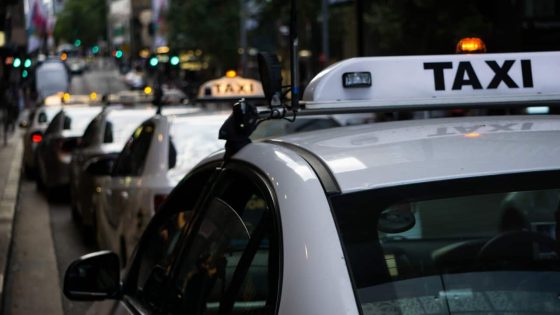Key Points
- Taxi drivers in Hobart have held a peaceful rally and gone on strike in response to a series of violent incidents.
- Videos shared online show a group of youths confronting drivers and yelling racist slurs.
- Drivers say Tasmania needs a political strategy to improve their safety at work and address youth crime.
Taxi drivers in Tasmania have gone on strike and rallied in response to what they describe as a spate of violent attacks and youth crime.
Videos shared online by the Hobart Taxi Drivers Association show a group of youths confronting taxi drivers, trying to fight them and yelling racist slurs.
The videos also show taxis with shattered windscreens, broken mirrors and scratches.
Li Max Joy, president of the association, said he believes youth crime has been an issue in Tasmania for years.
“We believe it is encouraging others to do the crimes, and there is a lot of crime going on (against) taxi drivers,” he said.
“Fare evasion is very common.”
People are jumping on top of the windscreen, smashing the glass, putting hands on the taxi drivers, or not paying the fare.
Why are taxi drivers on strike?
The drivers are striking from 7am to 7pm on Monday in Hobart, and held a peaceful rally in the city.
They are calling for a government strategy and laws to be passed giving them greater safety in the workplace, including more police patrolling taxi ranks.
Joy said the association is focusing on Hobart initially, but is also concerned about incidents happening in other areas.
He said while not all attacks are racially motivated, most of the drivers are migrants or come from culturally or linguistically diverse backgrounds.
“I don’t say that it is completely racial discrimination … but majority of people working are diverse,” he said.
Is youth crime on the rise in Tasmania?
Tasmania Police commander Jason Elmer confirmed taxis had been damaged during an altercation between taxi drivers and youth on Wednesday 24 April.
“It will be alleged that some weapons were produced by the youth, including a knife,” he told media on Monday.
“As a result of the disturbance at least three taxis were damaged, with windscreens damaged and mirrors torn off.”
He said the investigation was ongoing, and police were working to identify the youths and hold them to account.
When asked whether attacks on taxi drivers had increased, Elmer said there had been “only a couple” of reports in recent months, but said there could be attacks going unreported.
Videos posted on social media have shown taxis with windows smashed and broken mirrors. Source: Facebook / Hobart Taxi Drivers Association
“In terms of reports from taxi drivers, if I look at the last couple of months, in relation to incidents like this, we only have a couple of reports,” he said.
“That’s not to say perhaps some incidents have occurred that haven’t been reported to police, and I would encourage anybody who is the victim of any crime like this, particularly one that has involved violence, to come forward so that we can fully investigate the matter and hold those responsible to account.”
Elmer said youth crime has been an issue “for a period of time now”, adding that a “small number of youths” are responsible for “a large amount of the offending”.
Tasmania Police are trying to counter the issue through youth crime intervention areas, which aim to divert youth from the court system.
Police are also increasing foot patrols in areas frequented by youths, such as shopping centres.
Abuse occurring ‘almost daily’
Mala Crew, a barrister and community advocate, said she has observed racially motivated violence increasing in the community in recent years.
Crew, who has Indian heritage, said she has been verbally targeted in the street and has witnessed others experience much worse.
Almost on a daily basis, taxi drivers and bus drivers with Metro Transport are abused racially.
“Indian supermarkets and businesses, Nepalese, Pakistani, their business windows broken or (people) walk in and just disrupt everything … the owners are bashed, the staff are bashed. It has got really bad.”
Crew has created a petition, which she hopes will be tabled in parliament after the strike and protests.
She says young offenders should go through educational programs and mentoring rather than being given a “slap on the wrist”.
She is also calling for targeted anti-racism education to be part of school curriculums.
“We are calling on the government to actually, when it comes to legislation, to look at changes in legislation and policy reform,” she said.
“Instead of these kids going to court and then walking out with the slap on the wrist, we can actually engage them in programs and it’s got to be mandatory programs of education and mentoring.
“We need help to do that, we need help from government, we need a change in legislation, we need policy reforms.”


